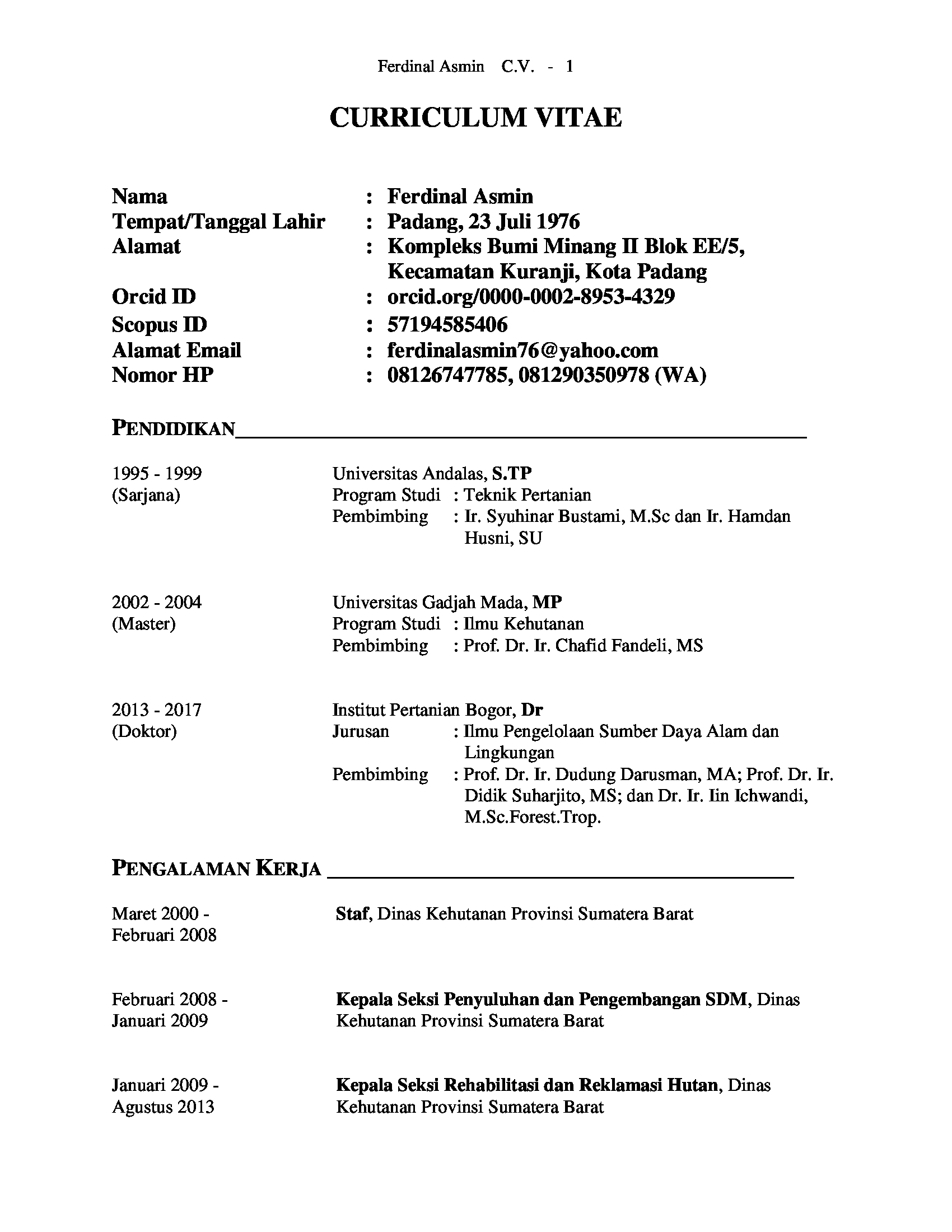DAMPAK PEMBERITAAN PENYEBARAN COVID-19 TERHADAP PENGELOLAAN HUTAN SUMATERA BARAT
Abstract
Covid-19's reporting through various media has had various impacts on development activities in West Sumatra, including in forest management. Covid-19 can be assessed as a disaster, which shapes people's perceptions of the risks. This study aims to determine the impact of reporting the spread of Covid-19 on social, economic, and ecological aspects of forest management in West Sumatra. The approach used is a quantitative approach through data collection using Google Form to respondents from social forestry activists, government officials, environmental activists, and community forestry entrepreneurs in West Sumatra. The analysis in this study uses descriptive statistical analysis. The results showed that the reporting of the spread of Covid-19 had shaped perceptions of risks to health, social activities and economic activities of the community. Related to the risks to forest management, the possible impacts are reduced institutional activity from farmers / forest farmer groups, decreased income of forest farmer families, and increased disruption to forest sustainability. The government needs to encourage community empowerment through forestry extension, the development of forestry-based economic activities, and efforts to sustainably forests and land rehabilitation to reduce the social, economic and ecological impacts
Downloads
References
Asmin, F. (2017). Modal sosial dalam pengelolaan hutan berbasis masyarakat di Sumatera Barat. Institut Pertanian Bogor.
Asmin, F. (2018). Konstruksi modal sosial bagi pengelolaan hutan berbasis masyarakat: sebuah kerangka konseptual. Jurnal Ilmu Sosial Dan Humaniora, 7(1), 32–45. https://doi.org/http://dx.doi.org/10.23887/jish-undiksha.v7i1.13301
Asmin, F., Darusman, D., Ichwandi, I., & Suharjito, D. (2019). Mainstreaming community-based forest management in West Sumatra: Social forestry arguments, support, and implementation. For. Soc, 3(1), 77–96. https://doi.org/http://dx.doi.org/10.24259/fs.v3i1.4047
Batubara, H. H. (2016). Penggunaan google form sebagai alat penilaian kinerja dosen di Prodi PGMI Uniska Muhammad Arsyad Al Banjari. Universitas Islam Kalimantan MAB, 8(1), 40–50. https://doi.org/https://doi.org/10.14421/al-bidayah.v8i1.91
Cahyono, A. S. (2016). Pengaruh media sosial terhadap perubahan sosial masyarakat di Indonesia. Jurnal Publiciana, 9(1), 140–157.
Démuth, A. (2013). Perception theories (Issue 4). Centre of Cognitive Studies at the Department of Philosophy, Faculty of Philosophy in Trnava. http://issafrica.org/crimehub/uploads/3f62b072bd80ab835470742e71a0fcb5.pdf%5Cnhttp://www.cdc.gov/ViolencePrevention/pdf/SchoolViolence_FactSheet-a.pdf%5Cnwww.sace.org.za
Drury, J., Novelli, D., & Stott, C. (2013). Psychological disaster myths in the perception and management of mass emergencies. Journal of Applied Social Psychology, 43(11), 2259–2270. https://doi.org/10.1111/jasp.12176
Fitriani, Y. (2017). Analisis pemanfaatan berbagai media sosial sebagai sarana penyebaran informasi bagi masyarakat. Paradigma - Jurnal Komputer Dan Informatika, 19(2), 148–152. https://doi.org/10.31294/P.V19I2.2120
Hackett, S., Schlager, E., & Walker, J. (1994). The role of communication in resolving commons dilemmas: experimental evidence with heterogeneous appropriators. Journal of Environmental Economics and Management, 27(2), 99–126. https://doi.org/https://doi.org/10.1006/jeem.1994.1029
Herdiana, D. (2020). Social distancing: Indonesian policy response to the Corona Virus Disease 2019 (COVID-19). Jurnal Ilmu Administrasi: Media Pengembangan Ilmu Dan Praktek Administrasi, 17(1), 93–110. https://doi.org/https://doi.org/10.31113/jia.v17i1.555
Ho, M. C., Shaw, D., Lin, S., & Chiu, Y. C. (2008). How do disaster characteristics influence risk perception? Risk Analysis, 28(3), 635–643. https://doi.org/10.1111/j.1539-6924.2008.01040.x
Mackenzie, N., & Knipe, S. (2006). Research dilemmas: paradigms, methods and methodology. Issues in Educational Research, 16(2), 1–13.
Mayner, L., & Arbon, P. (2015). Defining disaster: the need for harmonisation of terminology. Australasian Journal of Disaster and Trauma Studies, 19(SpecialIssue), 21–26. https://doi.org/http://hdl.handle.net/2328/37543
Oltedal, S., Moen, B.-E., Klempe, H., & Rundmo, T. (2004). Explaining risk perception: an empirical evaluation of cultural theory. In Risk Decision and Policy (Vol. 85). Rotunde. https://doi.org/10.1080/135753097348447
Rahayu, R. N., & Sensusiyati. (2020). Analisis berita hoax Covid-19 di media sosial di Indonesia. Jurnal Ekonomi, Sosial & Humaniora, 1(09), 60–73. https://doi.org/https://jurnalintelektiva.com/index.php/jurnal/article/view/122
Saputra, D. (2020). Fenomena informasi palsu (hoax) pada media sosial di tengah pandemi Covid-19 dalam perspektif Islam. Mau’idhoh Hasanah: Jurnal Dakwah Dan Ilmu Komunikasi, 1(2), 1–10.
Triyaningsih, H. (2020). Efek pemberitaan media massa terhadap persepsi masyarakat tentang Virus Corona (studi kasus masyarakat di Pamekasan). Meyarsa: Jurnal Ilmu Komunikasi Dan Dakwah, 1(1), 1–21. https://doi.org/http://dx.doi.org/10.19015/meyarsa.v1i1.3222
Ulya, H. N. (2020). Alternatif strategi penanganan dampak ekonomi Covid-19 Pemerintah Daerah Jawa Timur pada kawasan agropolitan. El-Barka: Journal of Islamic Economics and Business, 3(1). https://doi.org/https://doi.org/10.21154/elbarka.v3i1.2018
Wachinger, G., Renn, O., Begg, C., & Kuhlicke, C. (2013). The risk perception paradox-implications for governance and communication of natural hazards. Risk Analysis, 33(6), 1049–1065. https://doi.org/10.1111/j.1539-6924.2012.01942.x
With the receipt of the article by the Editorial Board of the Jurnal Pembangunan Nagari and it was decided to be published, then the copyright regarding the article will be diverted to Jurnal Pembangunan Nagari.
We hold the copyright regarding all the published articles and have the right to multiply and distribute the article under a Creative Commons Attribution-NonCommercial 4.0 International License (CC BY NC).
The Copyright Transfer Agreement can be downloaded HERE.
please fill, sign, scan and send it back in PDF format to myus8896@gmail.com and rosdalia@gmail.com













